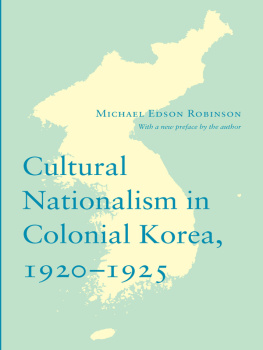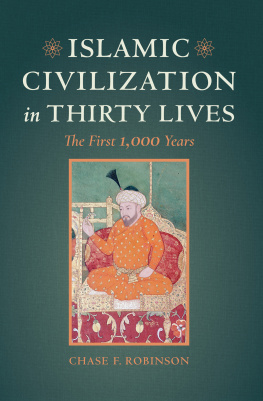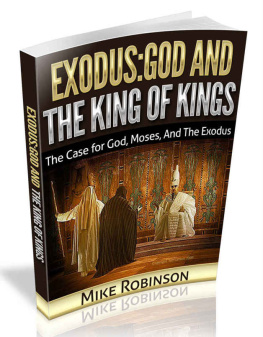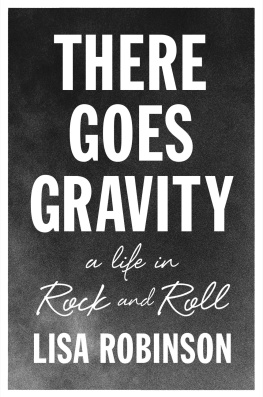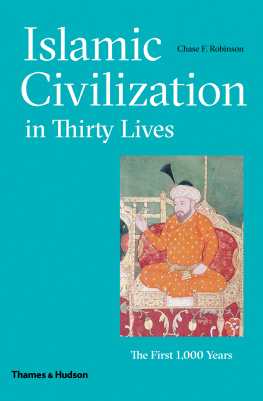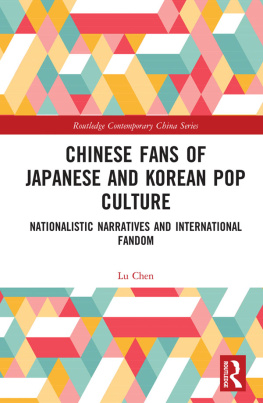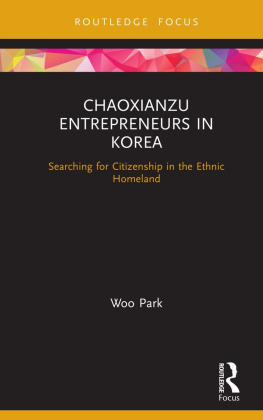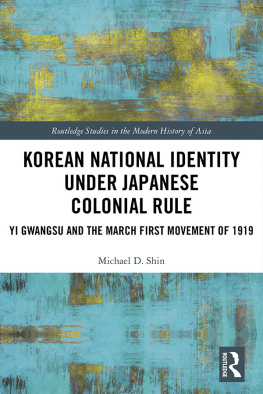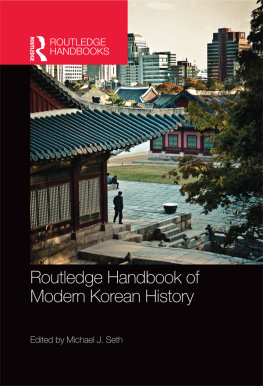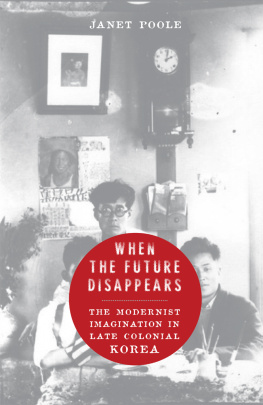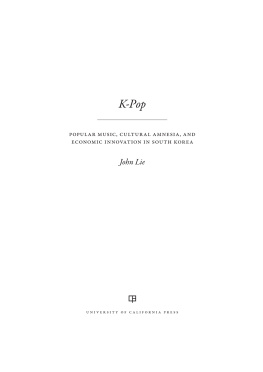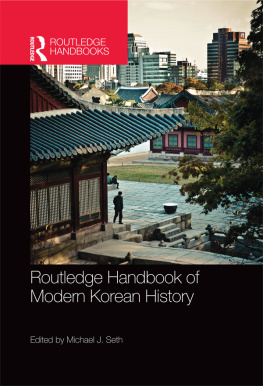KOREAN STUDIES OF THE HENRY M. JACKSON SCHOOL OF INTERNATIONAL STUDIES
Clark W. Sorensen, Editor
KOREAN STUDIES OF THE HENRY M. JACKSON SCHOOL OF INTERNATIONAL STUDIES
Over the Mountains Are Mountains: Korean Peasant Households and Their Adaptations to Rapid Industrialization, by Clark W. Sorensen
Cultural Nationalism in Colonial Korea, 19201925, by Michael Edson Robinson, with a new preface by the author
Offspring of Empire: The Koch'ang Kims and the Colonial Origins of Korean Capitalism, 18761945, by Carter J. Eckert, with a new preface by the author
Confucian Statecraft and Korean Institutions: Yu Hyngwn and the Late Chosn Dynasty, by James B. Palais
Peasant Protest and Social Change in Colonial Korea, by Gi-Wook Shin
The Origins of the Chosn Dynasty, by John B. Duncan
Protestantism and Politics in Korea, by Chung-shin Park
Marginality and Subversion in Korea: The Hong Kyngnae Rebellion of 1812, by Sun Joo Kim
Building Ships, Building a Nation: Korea's Democratic Unionism under Park Chung Hee, by Hwasook Nam
Japanese Assimilation Policies in Colonial Korea, 19101945, by Mark E. Caprio
Fighting for the Enemy: Koreans in Japan's War, 19371945, by Brandon Palmer
Heritage Management in Korea and Japan: The Politics of Antiquity and Identity, by Hyung Il Pai
Wrongful Deaths: Selected Inquest Records from Nineteenth-Century Korea, compiled and translated by Sun Joo Kim and Jungwon Kim
This publication was supported in part by the Korea Studies Program of the University of Washington in cooperation with the Henry M. Jackson School of International Studies.
1988 by the University of Washington Press
Preface to the 2014 edition 2014 by the University of Washington Press
Printed and bound in the United States of America
17 16 15 14 5 4 3 2 1
All rights reserved. No part of this publication may be reproduced or transmitted in any form or by any means, electronic or mechanical, including photocopy, recording, or any information storage or retrieval system, without permission in writing from the publisher.
UNIVERSITY OF WASHINGTON PRESS
PO Box 50096, Seattle, WA 98145, USA
www.washington.edu/uwpress
LIBRARY OF CONGRESS CATALOGING-IN-PUBLICATION DATA
Robinson, Michael Edson.
Cultural nationalism in colonial Korea, 19201925 / Michael Edson Robinson ; with a new preface by the author.
pages cm (Korean studies of the Henry M. Jackson School of International Studies)
Originally published: Seattle : University of Washington Press, 1988.
Includes bibliographical references and index.
ISBN 978-0-295-99389-8 (paperback)
1. NationalismKoreaHistory20th century. 2. NationalistsKoreaHistory20th century. 3. IntellectualsKoreaHistory20th century. 4. KoreaHistoryJapanese occupation, 19101945. 5. KoreaPolitics and government19101945. 6. KoreaIntellectual life20th century. I. Title.
DS916.55.R63 2014
951.9'03dc23
2013048055
The paper used in this publication is acid-free and meets the minimum requirements of American National Standard for Information SciencesPermanence of Paper for Printed Library Materials, ANSI Z39.48-1984.
ISBN-13: 978-0-295-80514-6 (electronic)
To June and Homer
Acknowledgments
I began to work on the research for this book in 1975 in preparation for my Ph.D. dissertation under the direction of Professor James B. Palais of the University of Washington. I owe a profound debt of gratitude to Professor Palais for his tireless support and encouragement and his invaluable scholarly criticism and advice at all stages of this project. I would also like to thank Professors Kenneth B. Pyle and Bruce Cumings for their assistance and encouragement during and after my graduate studies.
The research and preparation of this book was supported at various stages from the following sources: National Language Fellowship Grants, H.E.W. Fulbright-Hays Doctoral Dissertation Research Abroad Fellowship, Social Science Research Council, John Randolph Haynes and Dora Haynes Faculty Fellowship, and the International Cultural Society of Korea. While in Korea, I benefited from the guidance and support of Professor Kim Junyop at the Asiatic Research center of Korea University. In addition, discussions with Professor Lew Young-ick of Hallyon University provided me with insights that improved the manuscript. Professor Sin Yongha also helped me at critical times during my stays in Korea, and I must also acknowledge Kim Kunsu for opening his collection of colonial periodicals to my scrutiny. Finally, I owe a special debt to Professor Chong Chinsok for giving unselfishly of his time and expertise as I submerged myself in the often baffling world of Korean colonial publications.
I would also like to thank my colleagues at the University of Southern California Department of History. In particular, I benefited from discussions and comments from Professors John E. Wills Jr. and Gordon M. Berger. Special thanks are also due the staff of the U.S.C. Department of History, especially Martha Rothermel who, without complaint, prepared the manuscript in its numerous incarnations.
In addition, I am grateful to the University of Washington Press for their interest in the manuscript. The labors and professional skill of my editor, Margery Lang, greatly enhanced the manuscript. I, of course, am responsible for any errors or omissions.
My greatest debt I save for last. I wish to thank my parents, Homer and June, for giving me the gift of learning and introducing me to the world of books. Their interest in teaching led me to the life of scholarship. And, finally, a special thanks to my wife, Ellen Brennan, for her patience, support, and love during both the dark and light moments.
Preface to the 2014 Edition
The research for Cultural Nationalism was done largely in the mid-1970s, reflecting my training in political science theory based on structuralist understandings of nationalism's antecedents. The book thus does not utilize the vocabulary that evolved in the late 1980s to describe nationalism as a constructed notion, nor was I aware, when writing it, of the uses for narrative theory. By the 1990s, a better understanding of intellectual and cultural history had come to dominate the field. If it had been written then, this would have been a different book.
However, the work still has legs. Indeed, the debate in the 1920s between radical nationalists, who were informed by their enthusiasm for social revolutionary programs, and their older, moderate to liberal capitalist and culturalist colleagues, presaged the emerging global struggle between alternate paths to modernity. It is sometimes hard to remember that in the 1970s, leftist intellectuals in North America and Europe, in the absence of a true understanding of the Cultural Revolution, were still interested in Maoism and the great experiment under way in the People's Republic of China. I wonder how the nationalist debates would be framed today, if we began our study from scratch without the context of the Cold War.
Framing the discourse of the 1920s as the emergence of the decisive left-right fissure of the nationalist movement served to highlight and create the historical roots of what became a divided Korea after 1945. While not denying the pivotal role played by the joint occupation of the US and the USSR, historicizing the roots of Korea's divided nationalist movement added depth to the discussion of how the combined leadership of Korea's nationalist and socialist movements was effortlessly (or so it seemed) polarized in the crucial 194548 interregnum, before the emergence of separate Korean nation-states. Highlighting the early ideological divide between fundamentally different visions of a future Korean nation helped us understand the distortions in each Korean state's master narrative deployed for legitimation purposes. In the mid-1970s, nationalist historians berated my choice ofYi Kwangsu's essays as representative of a moderate nationalist strategy. Apparently Yi's later vilification as a collaborator was enough to discredit his earlier writings, yet any serious examination of the debates at the time would find Yi in the middle of nationalist activity and speaking for a broad segment of activists. Moreover, working on this project at the height of Park Chung Hee's Yusin repression made it difficult to discuss the breadth and quality of socialist discourse evident at the time, as I had picked subjects that did not fit into a highly politicized and narrowly framed nationalist history. Had I been in the North trying to do the same, I probably would not have been able to do this study at all.

